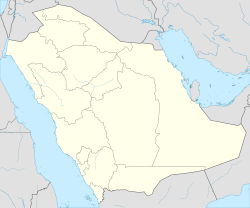Abqaiq (Arabic: بقيق, romanized: Biqayq) is a Saudi Aramco gated community and oil-processing facility located in the Eastern Province of Saudi Arabia, located in the desert 60 km southwest of the Dhahran-Dammam-Khobar metropolitan area, and north of the Rub' al-Khali, the second largest sand desert in the world also known as the "Empty Quarter". The community was built in the 1940s by Aramco (now Saudi Aramco). The Abqaiq community had a population of approximately 1,500 in 2012, though the inclusion of the population outside the Saudi Aramco community brings this number closer to 45,000 (2022 census).[1]
Abqaiq
بقيق | |
|---|---|
| Coordinates: 25°56′06″N 49°39′58″E / 25.93500°N 49.66611°E | |
| Country | Saudi Arabia |
| Province | Eastern Province |
| Established | 1940 |
| Government | |
| • Provincial Governor | Saud bin Nayef Al Saud |
| Population (2022 census) | |
| • City | 45,032 |
| • Metro | 64,632 (Abqaiq governorate) |
| Time zone | UTC+3 |
| • Summer (DST) | UTC+3 |
| Postal Code | (5 digits) |
| Area code | +966-13 |
| Website | Official website |

Abqaiq has been organizing a Safari Festival since 2017. The 10-days festival aims at presenting the Arab and desert heritage by presenting different shows.[2]
Terrorism and security edit
Abqaiq was the site of a terrorist attack attempt by al-Qaeda[3] on 24 February 2006, targeting the oil processing facility.[4] The 250-hectare complex can process 7 million barrels of oil a day. According to Ali Al-Naimi, "One of the cars exploded at the outer perimeter gate after guards fired on it. The second car made it through the first gate but also exploded under fire in a parking area. Both of the terrorists were killed."[5] News of the attack pushed oil prices up by 2 dollars. The damage, however, was immediately contained by Saudi Aramco. According to Khalid R. al-Rodhan of the Center for Strategic and International Studies, "even if some of the facilities were destroyed, Saudi Aramco has claimed that it has backup and redundant facilities to produce at near capacity". In a report about the incident, he concludes that "the attack against Abqaiq should not be seen as a turning point in either Saudi stability or the global energy market. Rather, it is evidence that al-Qaeda and other extremists groups will stop at nothing to disturb the global economy and international peace. It also signals that al-Qaeda is changing tactics to attack an area that will garner most attention and inflict most damage on the Saudi leadership, the U.S., and the international community."[6]
However, a moderate to severe attack on Abqaiq would slow production from an average of 6.8 million barrels (1,080,000 m3) a day to 1 million barrels (160,000 m3). The chief purpose of Abqaiq is to remove hydrogen sulfide from crude oil and reduce the vapor pressure, making the crude safe to be shipped in tankers. Abqaiq is the world's largest facility for this stabilization.[7]
On 14 September 2019 Abqaiq was attacked. The Houthis claimed responsibility, stating that they were retaliating for the Saudi Arabian-led intervention in Yemen. The United States government claimed that instead the attack may have originated in Iraq or Iran, stating that the impacts were consistent with an attack from that direction.[8] No casualties were reported, and the damage cut Saudi Arabia's oil output by half, or 5% of the global oil supply.[9]
Transportation edit
Airport edit
There is a small single strip airport in Abqaiq (Abqaiq Airport), operated by Saudi Aramco and not open for commercial air traffic. However, people utilize the nearby King Fahd International Airport in Dammam which is currently 90 km away from Abqaiq (new road project currently in progress to shorten the distance to 70 km). It also provides full international air service. Alternatively, Al-Ahsa International Airport is just 80 km from Abqaiq however it offers limited international service.
References edit
- ^ "Places in Abqaīq (Eastern Region Region, Saudi Arabia) - Population Statistics, Charts, Map, Location, Weather and Web Information". www.citypopulation.de. Retrieved 5 February 2024.
- ^ "Abqaiq Safari Festival attracts 200,000 visitors". Arab News. 6 January 2019. Retrieved 6 January 2019.
- ^ "Shaikh Bin Baz On Contemporary Takfiri Jihadis: Cut Off From Them, They Are The Brethren of The Devil". www.islamagainstextremism.com. Retrieved 8 April 2021.
- ^ "Saudis 'foil oil facility attack'". BBC News. 24 February 2006. Retrieved 8 April 2013.
- ^ Al-Naimi, Ali (2016). Out of the Desert. Great Britain: Portfolio Penguin. p. 247. ISBN 9780241279250.
- ^ Al Rodhan, Khalid R. (27 February 2006). "The Impact of the Abqaiq Attack on SaudiEnergy Security" (PDF). CSIS. Archived from the original (PDF) on 15 September 2012. Retrieved 8 April 2013.
- ^ "Saudi Explosion". Los Angeles Times. Retrieved 8 April 2013.[dead link]
- ^ JON GAMBRELL; ZEKE MILLER (16 September 2019). "Trump: US locked and loaded for response to attack on Saudis". Associated Press. Retrieved 16 September 2019.
Officials said the photos show impacts consistent with the attack coming from the direction of Iran or Iraq, rather than from Yemen to the south.
- ^ "Saudi Arabia oil facilities ablaze after drone strikes". BBC. 14 September 2019.
External links edit
- Aramco Services - Photo tour and info about Bqaiq (and other Aramco communities) under "communities" link
- Article: "Saudi Aramco Abqaiq Plant partners with Integration Objects to optimize plant operations" in the Oil&Gas Financial Journal Archived 1 October 2011 at the Wayback Machine
